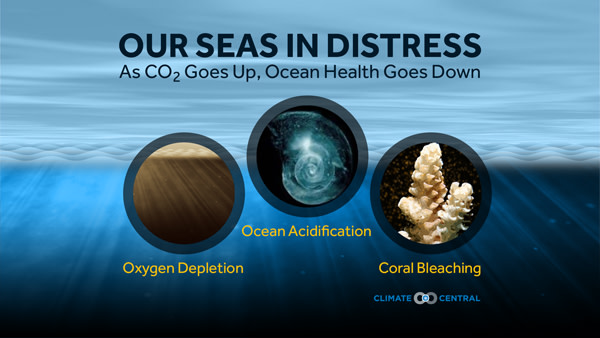June 8th is World Oceans Day, a day to raise awareness of the ocean’s importance to the planet. 93% of the excess heat absorbed by the climate system goes into our oceans, creating major consequences to the planet. While more extreme storms and rising sea levels are some of the impacts of warmer oceans, rising CO2 levels and the resulting warmer oceans are impacting ocean health itself. The most well-known effects are coral bleaching and ocean acidification, but an emerging issue is the decreasing oxygen levels in the warming waters to the planet.
Oxygen enters the ocean through two ways: interactions between its surface and the atmosphere, and as a photosynthesis byproduct from phytoplankton in upper layers of the ocean, much in the same way plants on land produce oxygen. As the ocean waters warm, they aren't able to hold as much oxygen (decreased solubility). Normally, oxygen-rich water mixes with deeper layers of the ocean that tend to be oxygen-poor. But warmer water creates an ocean that is more intensely stratified, meaning it is less likely to mix with the colder water found below. As a result, not only is less oxygen dissolved in the oceans, but it’s harder for it to be mixed to deeper areas.
When water loses most of its oxygen, it creates areas referred to as “dead zones,” where most marine plants and animals cannot survive. While these dead zones are often caused by fertilizer runoff currently, it seems the decreasing ability of the oceans to hold dissolved oxygen with continued warming will increasingly become a problem for marine ecosystems and fisheries in the coming decades.
A recent study found that 15% of the observed oxygen loss in oceans since 1960 could be attributed to the effects of warming water. Since 1960, the researchers found that dissolved oxygen content in oceans has declined by 2% on average. This percentage is not evenly distributed, and some oceans have lost significantly more. Another recent study projects that with unabated greenhouse gas emissions, oxygen lows will fall below their current range of variability by midcentury, forcing marine systems to either adapt or move in order to survive.
